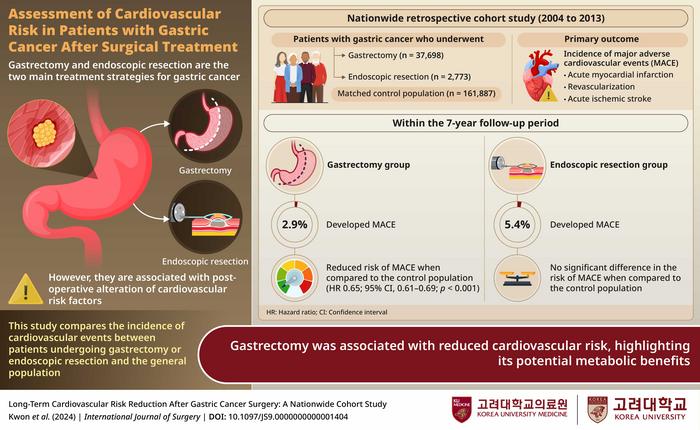Korea University study reveals that gastric cancer surgery may reduce heart disease risk reduced
Gastric cancer, also known as stomach cancer, is a highly prevalent and aggressive form of the disease that increases the risk of cardiovascular diseases. Depending on the stage of the cancer, treatment typically involves the surgical removal of cancer-affected tissue. The surgical procedures include gastrectomy – a surgery to remove a portion or the entire stomach, and endoscopic resection – a non-invasive method that uses an endoscope to guide precise removal of the tumor. Both surgical procedures for gastric cancer treatment alter cardiovascular risk factors but differently. However, the impact of gastric cancer surgery on the incidence of cardiovascular events is ambiguous.

Credit: Professor Yeongkeun Kwon from Korea University College of Medicine
Gastric cancer, also known as stomach cancer, is a highly prevalent and aggressive form of the disease that increases the risk of cardiovascular diseases. Depending on the stage of the cancer, treatment typically involves the surgical removal of cancer-affected tissue. The surgical procedures include gastrectomy – a surgery to remove a portion or the entire stomach, and endoscopic resection – a non-invasive method that uses an endoscope to guide precise removal of the tumor. Both surgical procedures for gastric cancer treatment alter cardiovascular risk factors but differently. However, the impact of gastric cancer surgery on the incidence of cardiovascular events is ambiguous.
To fill this gap, a research team led by Assistant Professor Yeongkeun Kwon, from the Division of Foregut Surgery, Korea University College of Medicine conducted a nationwide cohort study to investigate the long-term risk of cardiovascular diseases in patients with gastric cancer who underwent surgical treatment. Their findings were made available online on March 28, 2024 in International Journal of Surgery.
The researchers analyzed the incidence of major adverse cardiovascular events (MACE) such as heart attack and stroke between patients who underwent surgical treatment for gastric cancer, and the general population, between 2004 and 2013. They observed that within a seven-year follow-up period, only 2.9% of patients who underwent gastrectomy developed MACE. In contrast, 5.4% of patients who were treated with endoscopic resection developed MACE within the same period.
Elaborating on the clinical importance of their research findings, Prof. Kwon explains, “There are concerns that the surgical modalities used to treat gastric cancer that remove a part of the stomach or the whole organ can result in other health hazards. Our study demonstrates that gastric cancer surgery has health benefits in terms of reduced cardiovascular risk”.
Furthermore, statistical analysis revealed a significantly lowered risk of MACE in patients who underwent gastrectomy when compared to the general population. However, the risk of MACE in the endoscopic resection group was not significantly different than that of the general population. Further research into the specific risk factors that influence the incidence of cardiovascular disease is needed.
Sharing the long-term implications of their study, Prof. Yeongkeun concludes, “Korea has the highest long-term survival rate for gastric cancer in the world and, therefore, also has the largest amount of data available on long-term survivors of gastric cancer. If information on the health status of long-term stomach cancer survivors like our study is accumulated, healthcare professionals and gastric cancer patients will be able to make informed decisions that can greatly improve treatment outcomes.”
***
Reference
Title of original paper: Long-term Cardiovascular Risk Reduction After Gastric Cancer Surgery: A Nationwide Cohort Study
Journal: International Journal of Surgery
DOI: https://doi.org/10.1097/js9.0000000000001404
About the institute
Korea University College of Medicine is the medical school of Korea University. It is located in Seoul, South Korea. As one of the oldest medical schools in South Korea, it has been historically regarded as one of the country’s top medical schools. The school was founded as Chosun Women’s Medical Training Institute in 1928 by Rosetta Sherwood Hall. The institute was subsequently renamed several times and ultimately merged with Korea University to become Korea University College of Medicine. So far, the school has produced over 7,000 graduates, most of whom are working as prominent physicians and public health advocates worldwide.
Website: https://medicine.korea.ac.kr/en/index.do
About the author
Professor Yeongkeun Kwon is an Assistant Professor at the Bariatric Center and Division of Foregut Surgery at Korea University Anam Hospital. His research focuses on the areas of bariatric surgery, obesity, cancer survivorship, and diabetes. Along with his team, is conducting research to explore the health status of gastrectomy patients (gastric cancer surgery, bariatric surgery) and the effects and mechanisms of gastrectomy on metabolic comorbidities. He has published 46 research papers in peer-reviewed, high-impact factor journals and has 3 patents to his credit.
Journal
International Journal of Surgery
DOI
10.1097/js9.0000000000001404
Method of Research
Observational study
Subject of Research
People
Article Title
Long-term Cardiovascular Risk Reduction After Gastric Cancer Surgery: A Nationwide Cohort Study
Article Publication Date
28-Mar-2024